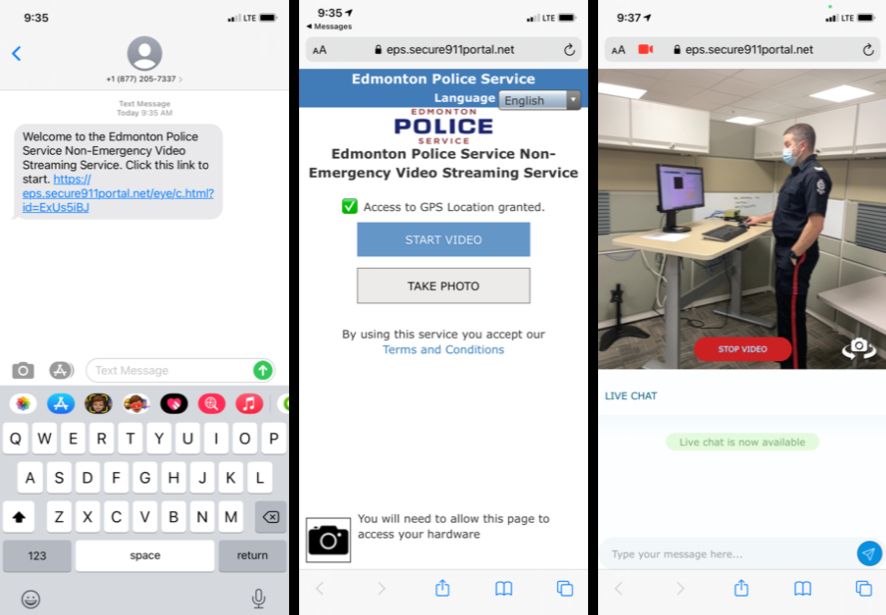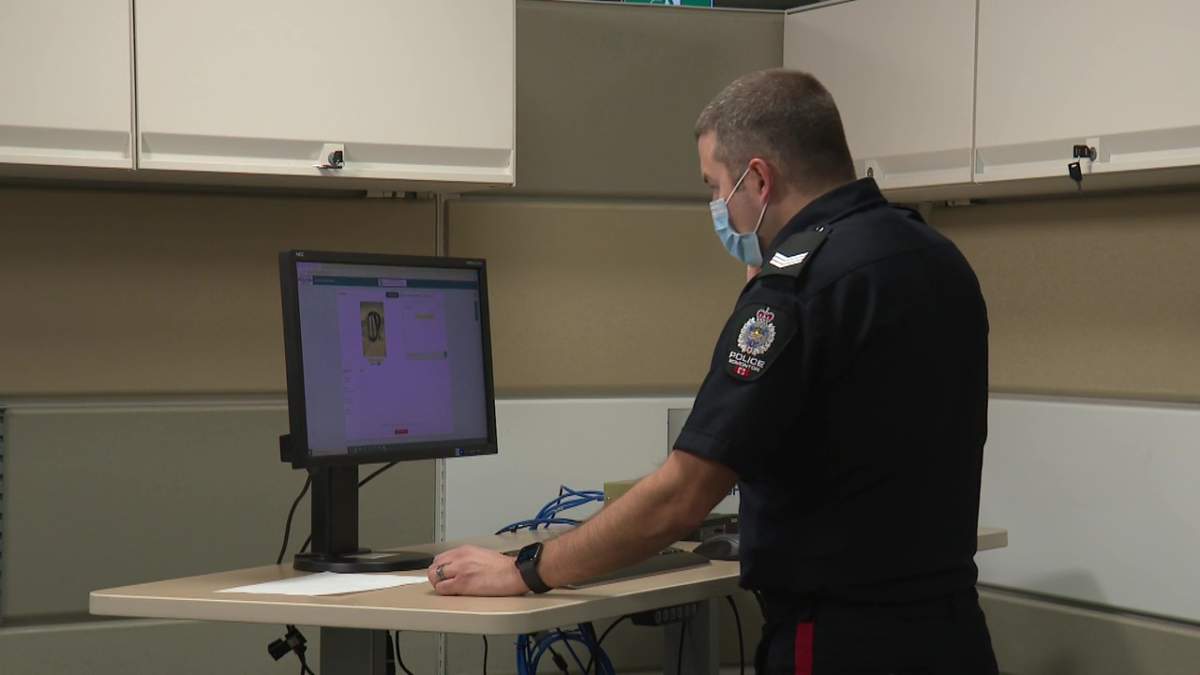After testing it out this past year, the Edmonton Police Service is the first Canadian police agency to sign on to a live video technology allowing 911 callers to remotely show first responders what they calling for help with.

Since March 2020, Edmonton police have been testing in non-emergency situations a tool called 911eye.
Here’s how it works: Typically, a caller to police needs to describe a scene and give a location. With 911eye, a link is sent to the person’s mobile device after they give police permission to do so.
Once connected, an EPS member can view live video of a situation, receive GPS coordinates and share information with officers who may need to respond to the scene — all while maintaining contact with the caller.
“Obviously anything in progress, anything critical, we still have our patrol response models for those purposes,” said Sgt. Blake Schols, the officer in charge of the Edmonton Police Service member experience unit.
While every investigation is unique, in general Schols said situations where the tool would be used include ongoing fraud investigations where officers need to see documents a victim is having trouble scanning, as well as break-ins and vandalism where the suspect is no longer around.
“Maybe you’re dealing with mischief to a vehicle and you’re trying to show all the damage to the back right panel — a picture is worth a thousand words, correct?”
“There are some investigations that don’t necessarily need first-hand on-scene police response.”
No download required
The 911eye program is browser-based and does not require users to download and install software or apps. Schols said the force brought in the virtual tool when the COVID-19 pandemic began, as a way to increase social distancing.
“The primary initial focus was obviously the health and safety,” he said, adding the efficiencies it has presented are undeniable. “Not having somebody in a physical patrol car, having to drive up to a physical location. There’s time saved in that.”

Get daily National news
Schols said citizens benefit as well, by not having to wait around for an officer to show up at their house.
“We’re kind of changing the lens on how policing works,” Schols said.
“We still need to have that eye on scene. We want to be able to do some walk-throughs and look at evidence. But how do we do it smarter, quicker, more efficient and most importantly, more safe with the current state of global affairs?”
A report in early 2020 found Edmonton police was struggling to meet its response time targets for low priority calls. In addition to helping address that, the cloud-based program has shown the force how it can evolve the investigative process to keep up with technology.
“How do we serve the public in a better and more efficient fashion? 911eye is one of those tools in the toolset that we need to accomplish that,” Schols said.
Another tool in the box
This is one of many tools Edmonton police is looking at as it plans its move towards the next generation of 911 emergency response, dubbed Next Gen 911.
“Today, when you think about dialing 911, it’s exactly that — everyone thinks dialing,” Schols said of the analog process. He said the internet and smartphones have opened up a new world of communication and emergency agencies have to adapt with it.
“In the future with next gen, we’re talking text, we’re talking video call, email — you name it. The police have to be available for all of these mediums going forward.”
Schols said police want to give people other options for seeking help, especially in an emergency situation where they can’t pick up the phone and use their voice, but could send a text or other discreet form of communication.
“Those are the things that Next Gen 911 is supposed to start building on, and you can see why technology such as (911eye) which is very digital focused, will really get benefit out of that move.”
The EPS is the first police agency in Canada to use 911eye. Calgary-based consulting company Levvel Inc. partnered with UK-based technology company Capita Solutions to bring the program to Edmonton police.
Levvel Inc. said the program is currently being used by other emergency service agencies in the U.K. and U.S., including fire, police, housing authorities, and utility companies.
“This is not something we can just Big Brother or way into,” Schols said, explaining 911eye doesn’t grant police unrestricted access to a user’s phone.
“Every step away with 911eye is voluntary. So whether it’s giving access to the camera, it does ask if you’d like to share your location. All of these things have to be answered with a yes or no from the citizen.
“If they don’t answer with a yes, I simply just don’t have access.”
Schols said a few dozen police officers are trained to access the system. He said it won’t replace all instances of an officer needing to go to a scene, but instead will help get the ball rolling on some files.
“Is that smoking gun evidence in court? Not necessarily, but it certainly helps build the profile in the investigative information that we need to create a proper and fulsome police report.”






Comments
Want to discuss? Please read our Commenting Policy first.